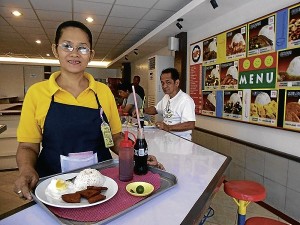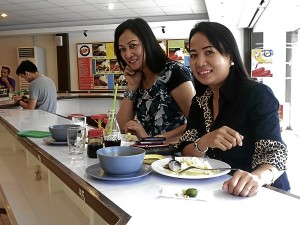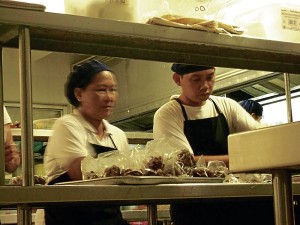The man who brought ‘tapsilog’ to Davao
DAVAO CITY—For 27 years, the homegrown food counter that first brought to this city the mouth-watering beef tapa, sinangag (fried rice) and egg (known as tapsilog) dishes one can eat in a hurry—has grown from a five-staff affair to a source of job for over 100 people.
But owner Benjamin Lizada says Taps, the company which began as a wooden food counter in 1985 and has grown to include five outlets and two franchises over the years, is now doing some make-over to keep up with the times.
Taps has been known for its open-air, stool and counter-type of service for years that consumers were a bit surprised to find themselves in one of Taps’ first air-conditioned outlets on Governor Duterte Street in August last year.
“Before, people used to consider aircon as a luxury but now, Davao consumers expect it as part of your service,” says Lizada, company president. “So our solution is to upgrade.”
Long entrenched in a lot next to Hotel Galleria on Duterte Street, Taps now sports a new Busog Pinoy sign, the bold white font on its vermillion red signage, the glass walls and the overall upbeat look now competing head on with the new fast food chains opening across the street.
Although the Taps’ Duterte outlet has retained its food counter type of service in an air-conditioned setting, its Matina Town Square (MTS) outlet uses chairs and individual tables, just like regular fastfood chains, to draw the student crowd in Matina.
Lizada says he will also encourage his franchisees to install air-conditioning in their outlets, if his campaign to win over more customers will work.
The Taps make-over is more than just skin deep. The food outlet has also started offering new items on its menu, including among others the sizzlers, complete with special gravy concocted by niece Robbie Aguilar, who studied culinary arts in New York.
“They (gravies) are a bit expensive, but it’s okay as long as we will not just be lumped like all the others,” Lizada says.
“It’s not the typical gravy because aside from its special ingredients, it entails long hours of processing,” he adds.
Lizada says the entry of more food establishments in the city in the last five years and the “mall mentality” fast sweeping over the people of Davao has been hurting the company’s luncheon crowd.
“Just open an airconditioned restaurant now and people will come,” Lizada, who grew up in a family of restaurateurs, observes. “Hopefully, with this new concept, we will improve our market.”
Taps opened its first outlet in Davao in 1985, a year after Lizada finished college and after managing the family-owned Harana and Bistro Rosario restaurants. With only some P40,000 capital he borrowed from his father, he partnered with his cousin, the late Jongjong Tionko, who owned the lot of what is now the Bagobo Hotel, and opened the first Taps outlet there.

Menu
But the Manila types (of stores) were very specific in their recipes, he says. In Davao, his sister Amelou expanded the menu to include primasi (pritong manok, sinigang), lekasi (lechon kawali, sinigang); and even introduced the kilawin and other Filipino fare. “Actually, what I liked to eat I put them in the menu,” he says.
From its original breakfast fare, Taps has also expanded its menu to include heavy meals and soups like Ox Feet, Bistek (Pinoy Beef Steak), Pikol Express (sweet pickled vegetables), Bangus Belly, among others.
Lizada says over the years, Taps remains top of mind in Davao as far as tapa and other breakfast fares are concerned.
“Over the years, we have created a market,” he says.
Since its beginning, Taps has targeted students, office workers, even churchgoers, and other people in a hurry to eat, among its customer base. People of this type only eat, get up and go, and never linger for long hours to just enjoy free Wi-Fi, allowing for a high turnover of clients for counter type food outlets.
“Stools are not really that comfortable and there are certain types of people who don’t like it but there are also those who do, the get-up-and-go-type, who find it really convenient to eat here,” he says.
After its first store, Taps opened a new outlet in the city every year until the Asian financial crisis hit the country in 1997 and the food business experienced a plateau. He said a similar crisis hit the food industry in 2008.
He got back his first investment cost after three years and rolled it up again to open another store. “In the food business, if you don’t get back your investment after five years, you’d better fold up, as a rule,” he says.
Outlets
Lizada still remembers the series of outlets which eventually closed down, either because their contracts for the lot were not renewed, or the outlets simply did not click. They included those they opened on San Pedro and Ponciano Streets.
But the outlets which remained included the one on Duterte street, a block away from where the Bagobo Hotel stands now, its original site; another outlet on Bolton street (which is open 24 hours), its second oldest outlet on Palma Gil Street, and the MTS and the SM outlets.
Taps also runs a franchise in Lanang (also in Davao City), and another one in Digos City, Davao del Sur.
Lizada says most of the outlets located near schools, churches, hotels and restaurants have been doing well, as its outlet on Duterte street, only a few paces away from Davao Doctor’s hospital; and its Palma Gil outlet, just a stone’s throw away from the Apo View Hotel and the church of the United Churches of Christ of the Philippines (UCCP). “It was one of our oldest branches,” he says.
Taps only had 25 stools when it started; its five-man team only included a washer, a cook, a cashier and two counter personnel. Now, the company employs over a hundred people in all of its five outlets, including the food commissaries, who maintained the standard and quality control of the food.
Taps did not employ food commissaries when they first started, he says.

Aside from ensuring uniformity, the commissaries also ensure that the food ingredients they serve stay fresh and safe to eat. Often, commissaries pay a visit to each outlet to inspect. “Through the years, we keep prices down,” Lizada says. “We offer reasonable prices for food, but the key for staying up until now lies in our personnel,” he says.
“In a business like this, you have to take care of your people,” he says.
“So, we followed the formula of the family business of Harana of providing for the housing of our people, because once they are secured they will not leave the company.”
But he says even then, competition did not prevent a few of their staffs from leaving the company. With the sprouting of malls in Davao, he notices that Taps’ luncheon crowd has been waning while its breakfast and dinner crowd almost stayed the same. He attributes this to people’s preference for cooler places, when the sun’s heat is at its peak. He calls it, the mall mentality.
“By embarking in this campaign, we hope we can get our luncheon customers back,” he says.
